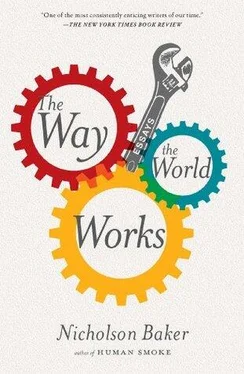Nicholson Baker - The Way the World Works
Здесь есть возможность читать онлайн «Nicholson Baker - The Way the World Works» весь текст электронной книги совершенно бесплатно (целиком полную версию без сокращений). В некоторых случаях можно слушать аудио, скачать через торрент в формате fb2 и присутствует краткое содержание. Год выпуска: 2012, Издательство: Simon & Schuster, Жанр: Публицистика, Критика, на английском языке. Описание произведения, (предисловие) а так же отзывы посетителей доступны на портале библиотеки ЛибКат.
- Название:The Way the World Works
- Автор:
- Издательство:Simon & Schuster
- Жанр:
- Год:2012
- ISBN:нет данных
- Рейтинг книги:4 / 5. Голосов: 1
-
Избранное:Добавить в избранное
- Отзывы:
-
Ваша оценка:
- 80
- 1
- 2
- 3
- 4
- 5
The Way the World Works: краткое содержание, описание и аннотация
Предлагаем к чтению аннотацию, описание, краткое содержание или предисловие (зависит от того, что написал сам автор книги «The Way the World Works»). Если вы не нашли необходимую информацию о книге — напишите в комментариях, мы постараемся отыскать её.
), here assembles his best short pieces from the last fifteen years.
The Way the World Works
OED
Modern Warfare 2
Through all these pieces, many written for
, and
, Baker shines the light of an inexpugnable curiosity.
is a keen-minded, generous-spirited compendium by a modern American master.
The Way the World Works — читать онлайн бесплатно полную книгу (весь текст) целиком
Ниже представлен текст книги, разбитый по страницам. Система сохранения места последней прочитанной страницы, позволяет с удобством читать онлайн бесплатно книгу «The Way the World Works», без необходимости каждый раз заново искать на чём Вы остановились. Поставьте закладку, и сможете в любой момент перейти на страницу, на которой закончили чтение.
Интервал:
Закладка:
Debussy finished La Mer —adjusting its orchestration and correcting proofs — during a month in England in the summer of 1905, in Eastbourne, a late-Victorian summer resort where he had gone with Emma Bardac. Emma was married to a well-to-do banker at the time, and was very pregnant with Debussy’s only child. A few years ago, paging through one of the biographies, I stopped at a picture of Debussy frowning down into the viewfinder of a camera, on the stone-parapeted balcony of the Grand Hotel Eastbourne. The camera was pointed out at the English Channel. I was living in Ely at the time, north of Cambridge, but it occurred to me, as I consulted a map and a schedule, that I could easily go to Eastbourne and return the same day.
I rode the screeching, battered local train out one March morning; I walked into town and stopped at a used book store, which had nothing about Debussy, and then at the tourist information center, where a kind woman pulled out a red notebook entitled “Famous People,” with entries for Wordsworth, Tennyson, Swinburne (who wrote “To a Seamew” nearby, at Beachy Head), King Arthur, and Debussy. The woman pointed me in the direction of the Grand Hotel, and when I finally found it, after turning the wrong way on the shore road, I was told that room 277 was the Debussy Suite, but that they couldn’t let me in to look out the windows of the suite because it was almost check-in time and that night’s guests might arrive at any moment.
So I sat in the garden on a white bench, with my back to the sea, looking up at the balcony where Debussy and Emma had, not so many years ago, looked out over the channel toward an invisible France. The balcony was right over the main entrance, under the letters that spelled “Grand Hotel.” In the pale sunlight, I sketched the facade of the hotel, with its eye-guiding beaux arts urns and scrolls (designed by R. K. Blessley in 1876); it seemed to me that Debussy, often penniless and foolish about money, had felt industriously rich here, perhaps for the last time, as he put the final touches on his ebullient sea poem. A few months later, back in Paris, his wife, abandoned and heartbroken, shot herself near the heart, and though she recovered, everyone’s life was different afterward.
I went back inside the hotel and up the fire stairs to the second floor. (The stairs had nicely carved banister knobs.) It was one of those buildings in which the flights of stairs and the placement of windows are out of synchrony: in the stairwell, the top of the window frame was low to the floor, so that I had to bend way down, my head pounding, to get a proper view. I had only a minute or two before I needed to leave to catch the train back. There was dried rain-dust on the outside of the glass, but I looked out over the water and saw, near to shore, an unexpected play of green and gold and turquoise waves — not waves, really, because they were so small, but little manifestations of fluid under-energy. The clouds had the look that a glass of rinse water gets when you’re doing a watercolor — slowly diluting black roilings which move under the white water that you made earlier when you rinsed the white paint from the brush. But the sea didn’t choose to reflect the clouds that day; it had its own private mallard-neck palette, the fine gradations of which varied with the slopes of the wind-textured swells. Through the dirty window, I thought I saw, for a moment, what Debussy had seen.
(2001)
Why I Like the Telephone
When I was little, I played with the phone a lot. I liked the physical sensation of dialing, of having my finger guided in its numerical hole (first it was black metal, then more comfortable clear plastic) along arcs of a perfect circle, as if it were a pen in a Spirograph. Sometimes I hurried it back around and felt the center gear strain slightly.
Also, for a period of several years while I was growing up, no member of my family wore a watch, and our house had no dependably working clock. (We had an antique clock on the mantel but we often let it wind down.) My job was to call, often several times a day, the time-and-temperature number, sponsored by Rochester Savings Bank, and find out what time it was. I was delighted to make these calls. The other phone numbers I had memorized merely reached people my own age (e.g., my friend Fred, GI2-1397, and my friend Maitland, CH4-4158), but the time-temperature number linked me to a realer, kitchenless world of atomic clocks and compound interest and absolute zero, to times and temperatures thrillingly beyond dispute, endorsed, it seemed, by the National Bureau of Standards and the FDIC. The day after daylight savings, the time-and-temperature number was always busy, a sign of simultaneous citywide activity as definite as the drop in water pressure during the ad breaks in the Super Bowl.
Later I learned the trick of calling myself up: you dialed some short number (was it 811?), and you made a carefully timed click of the cradle, and, miraculously, your own phone, the phone you were touching, would ring — a result that seemed, in those years before the discovery of other solitary auto-dialed pleasures, exotic and shocking and worthwhile.
It isn’t stretching things too much to say that in Vox, my phone-sex novel, I was performing the novelistic equivalent of these early telephonic diversions: I was calling up, or calling on, what I hoped were National-Bureau-of-Standards-level verities about the interests and flirtations of two representatively chatty single phoners, a pair who began as strangers to me and to each other and who thus had to move as mere voices from the absolute zero of their initial connection to the high-Fahrenheit range of their affectionate spoken orgasms. And at the same time, of course, I was making my own phone ring.
(1994)
What Happened on April 29, 1994
A Contribution to 240 Ecrivains Racontent Une Journée du Monde, the Nouvel Observateur ’s anthology of events for April 29, 1994
I took my daughter to school, and then, at my office, I wrote an e-mail about library catalogs, although I was supposed to be reviewing a novel. A fact-checker from a newspaper called, wanting to know if I was thirty-seven, and whether it was correct to say that a book of mine had been published on a certain day in 1992. I had lunch at a Chinese restaurant with my wife and sleeping five-month-old son. We talked about an article on homelessness that she had read in the New York Review of Books . Then I wrote about library catalogs some more. When I got home, my daughter was wearing a new Girl Scout Brownie uniform. She was proud of her long, blue-tasseled socks, and her pride made my eyes fill with tears, partly because I was tired from writing about libraries all day.
Outside on the back deck, we used strips of masking tape to outline the dimensions of a possible second bathroom, to be installed in the laundry room. Chairs stood for the sink and the toilet; the space proved to be too small to accommodate a shower.
I bought hamburgers for dinner and rented Arsenic and Old Lace for us to watch as a family (never having seen it), but it frightened my daughter, so we stopped the tape. I made my son laugh by tickling the soles of his feet with my beard and making munching sounds at his ribs. When both children were asleep, my wife watched the rest of the movie while I, tipped sideways forty-five degrees, dozed on the couch. Then I went back to my office and sorted the mail I was supposed to answer into four piles. I didn’t actually answer any letters, but I felt that I had moved forward by sorting them. One of the pieces of mail I came across was a fax from Le Nouvel Observateur, and I realized that this was the very day I was supposed to write about and that I had thus far taken no notes. So I took some notes on the margin of the fax, which smudged on the shiny paper but remained legible.
Читать дальшеИнтервал:
Закладка:
Похожие книги на «The Way the World Works»
Представляем Вашему вниманию похожие книги на «The Way the World Works» списком для выбора. Мы отобрали схожую по названию и смыслу литературу в надежде предоставить читателям больше вариантов отыскать новые, интересные, ещё непрочитанные произведения.
Обсуждение, отзывы о книге «The Way the World Works» и просто собственные мнения читателей. Оставьте ваши комментарии, напишите, что Вы думаете о произведении, его смысле или главных героях. Укажите что конкретно понравилось, а что нет, и почему Вы так считаете.












